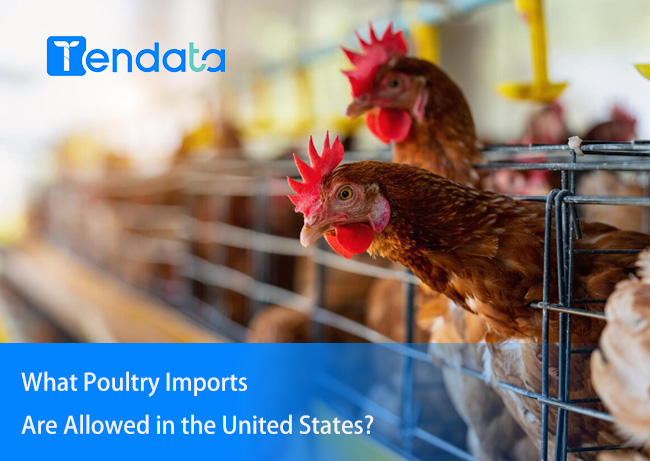 Import News
Import News
 15-03-2024
15-03-2024
Poultry imports play a significant role in meeting the demand for poultry products in the United States. However, the importation of poultry and poultry products is subject to a complex web of regulations, inspections, and market dynamics. In this article, we will explore the types of poultry imports allowed in the United States, the regulatory framework governing them, and the evolving trends in this industry.

Types of Poultry Imports
The United States permits the importation of various poultry products, reflecting the diverse demands of consumers and businesses. Here, we delve deeper into the types of poultry imports allowed in the United States:
· Whole Birds: Whole chickens, turkeys, ducks, and other avian species can be imported for further processing or direct sale. Whole birds are popular among consumers who prefer to prepare their poultry dishes from scratch, allowing for creative culinary exploration.
· Poultry Cuts: Imported poultry cuts, such as breast fillets, thighs, wings, and drumsticks, are commonly used by restaurants, foodservice establishments, and food manufacturers. These cuts are convenient for chefs and manufacturers as they reduce the need for extensive processing, saving time and labor costs.
· Processed Products: Processed poultry items, including sausages, nuggets, deli meats, and ready-to-eat meals, are also eligible for import. Processed products cater to consumers' busy lifestyles and offer a wide array of flavors and preparations. The convenience factor drives the demand for these imports.
· Eggs and Egg Products: Poultry eggs and egg products, such as liquid eggs, egg whites, and powdered eggs, are subject to import regulations to ensure their safety and quality. These products are used in various industries, including baking, food manufacturing, and foodservice. The importation of egg products plays a crucial role in meeting the demand for eggs in different forms.
· Specialty and Exotic Poultry: Importers may explore specialty and exotic poultry imports, including game birds like quail, pheasants, and guinea fowl. These unique offerings cater to niche markets and culinary enthusiasts seeking unconventional and gourmet poultry choices.
· Organic and Specialty Poultry: With the rising trend of health-conscious and environmentally aware consumers, organic and specialty poultry imports have gained traction. These products meet specific criteria, such as being raised without antibiotics, hormones, or on organic feed. Importers targeting this market must adhere to strict organic certifications and labeling requirements.
· By-Products and Derivatives: Poultry by-products, such as feathers, fat, and offal, are often imported for various purposes. Feathers may be used in the production of down and feather products, while poultry fat can be rendered into usable materials. The utilization of by-products ensures minimal waste and maximizes the value of imported poultry.
· Day-Old Chicks: The importation of day-old chicks is crucial for maintaining and expanding domestic poultry flocks. This type of import directly contributes to the sustainability and growth of the poultry industry in the United States.
In conclusion
Each category of poultry import serves a specific purpose and caters to distinct consumer preferences. Importers need to understand these categories thoroughly and stay informed about changing trends and regulations to make informed decisions in the dynamic poultry import market.
The poultry import market in the United States is expected to remain robust, driven by consumer demand for poultry products. As consumers seek diverse and high-quality poultry options, importers who can meet these demands are likely to thrive.
The United States allows a wide range of poultry imports, but navigating the regulatory landscape and market dynamics is essential. Importers must prioritize compliance with USDA and FSIS regulations while adapting to evolving consumer preferences and trade agreements. Keeping a pulse on economic factors and trade forecasts will help importers make strategic decisions in this competitive industry.
About Tendata
If you want to expand your export business and want to find out if there are export opportunities, there is much more you need to do! It may take a lot of time to conduct market research. Want to start your export business as fast as possible? Tendata can help you save up to 90% of your time!
Tendata provides real-time updated import and export data and customs data of 220+ countries, dynamically records the transaction details of each import and export goods, accurately mines and analyzes real buyers around the world based on big data AI intelligent technology, and easily matches the name, identity, position, email address, phone number and social account of the person in charge of purchasing in 10 seconds, which can satisfy all kinds of needs such as searching for overseas buyers, monitoring competitors, grasping market trends, improving enterprise competitiveness and so on. It can help you find overseas buyers, monitor competitors, grasp market trends, improve enterprise competitiveness and other needs, and help you quickly increase your company's revenue.

Category
Leave Message for Demo Request or Questions


 T-info
T-info T-discovery
T-discovery

 My
Tendata
My
Tendata Market Analysis
Market Analysis Customer
Development
Customer
Development Competitor
Monitoring
Competitor
Monitoring Customer Relationship
Customer Relationship





































































































































